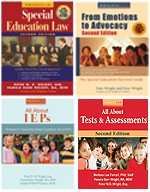What's In Store at Wrightslaw?
![]()
Special Ed Law & Advocacy Training (6.5 hrs)
25% Off the Wrightslaw Bundle of 4 PRINT books for $58.35 (Sorry, coupons not accepted on this product)
Includes Wrightslaw: Special Education Law, 2nd Ed., Wrightslaw: From Emotions to Advocacy, 2nd Ed., Wrightslaw: All About IEPs and Wrightslaw: All About Tests and Assessments, 2nd Ed.
New! The Wrightslaw Bundle is now available as an immediate PDF download. All four Wrightslaw books as PDFs for just $49.95!
![]()
Learning About the Family Education Rights and Privacy Act (FERPA)
 The
Family Education Rights and Privacy Act (FERPA) is a federal
statute designed to protect the privacy of students and parents.
FERPA deals with privacy and confidentiality, parent access to educational
records, parent amendment of records, and destruction of records.
The
Family Education Rights and Privacy Act (FERPA) is a federal
statute designed to protect the privacy of students and parents.
FERPA deals with privacy and confidentiality, parent access to educational
records, parent amendment of records, and destruction of records.
FERPA applies to all agencies and institutions that receive federal funds, including elementary and secondary schools, colleges, and universities. The statute is in the United States Code at 20 U.S.C.1232. The regulations are in the Code of Federal Regulations at 34 C.F.R. Part 99.
What are education records?
“Education records” are broadly defined as:
those records, files, documents, and other materials, which (i) contain information directly related to a student; and (ii) are maintained by an educational agency or institution or by a person acting for such agency or institution. 20 U.S.C. §1232g(a)(4)(A). See also 34 CFR §99.3.
Education records include “all instructional materials, including teacher’s manuals, films, tapes, or other supplementary material which will be used in connection with any survey, analysis, or evaluation as part of any applicable program shall be available for inspection by the parents or guardians of the children.”
The transcript of a hearing is an education record for purposes of Section 504. Due process decisions are education records. Tapes of IEP meetings are education records as are IEPs. Letters between parent and school are education records.
Personal notes and memory aids that are used only by the person who made them are not educational records. But if notes are shared with or disclosed to another person, notes are educational records.
What are the parent's rights to inspect and review education records?
Parents have a right to inspect and review all educational records relating to their child. This right to “inspect and review” includes the right to have copies of records and to receive explanations and interpretations from school officials. Agencies must comply with requests to inspect and review records within forty-five days. Destruction of records violates the parents’ rights of access.
Copies of records must be provided to the parent if failure to do so would prevent the parent from exercising the right to view records. Schools may charge reasonable copying fees unless the fee would “effectively prevent” the parent or student from exercising the right to inspect and review the records. Fees may not be charged for searching and retrieving records.
What about test protocols and answer sheets?
Completed test instruments or question booklets containing information that identify a particular student, whether or not the name of the student appears on the booklet, constitute “education records” subject to the FERPA requirements. In cases where a question booklet includes both the questions and the student’s responses, the question booklet is an education record subject to FERPA.
The Office for Civil Rights determined that the test protocols used by a psychologist to prepare a report are educational records and must be produced to the parents.
An educational agency is required to respond to a reasonable request for an explanation or interpretation of a student’s answer sheet. Because answer sheets are usually related to a student, answer sheets fall within the definition of education records that a parent has the right to inspect and review. As a parent, you have a right to access to your child’s answer sheet and an explanation or interpretation of that answer sheet.
On October 2, 1997, the Family Policy Compliance Office of the U. S. Department of Education issued a memorandum about parental access to test protocols. For the full text of this letter, follow the link to the FERPA Memorandum at the end of this article.
When may records be disclosed?
Schools may release records without consent to “other school officials, including teachers within the educational institution or local educational agency, who have been determined by such agency or institution to have legitimate educational interests.”
In health and safety emergencies, schools may make disclosures without consent. Law enforcement agencies and monitoring agencies have access to confidential records. The agency must maintain a log of all disclosures without parental consent. Consent for disclosure must be signed and dated and must include specific information about the recipients of information.
FERPA
Links
FERPA
Memorandum: Access to Test Protocols and Answer Sheets from
LeRoy Hooker.
[References: Wrightslaw: Special Education Law, pages 283-287, 34 C.F.R. Part 99, pages 289-299; Wrightslaw: From Emotions to Advocacy, pages 185-189]
Copyright © 1998-2022, Peter W. D. Wright and Pamela Darr Wright. All rights reserved. Contact Us
